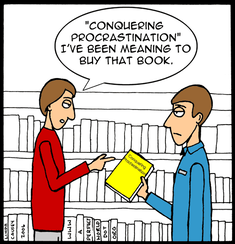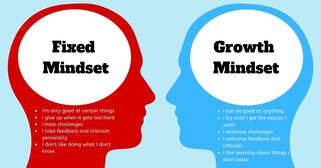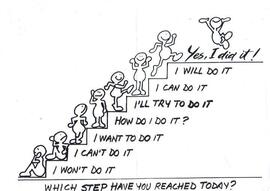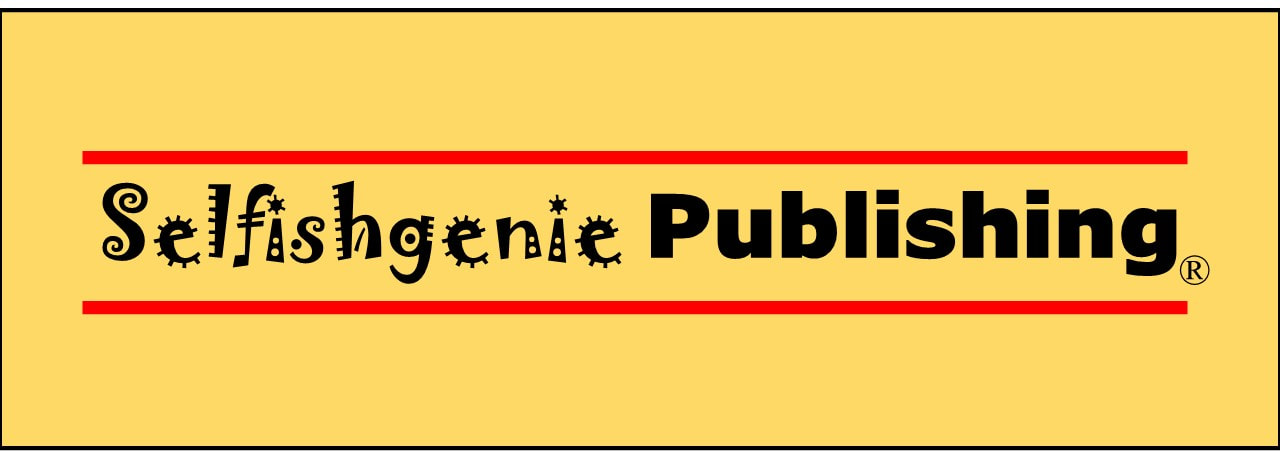 In 1742, poet Edward Young said “Procrastination is the thief of time”. Mind you, he didn’t actually get around to saying it out loud until 1743. No, that’s just my little joke. He said it in the poem “Night Thoughts on Life, Death and Immortality”. I’m not sure if authors are the worst when it comes to procrastination, but if the Selfishgenie Twitter feed is anything to go by, it certainly seems to be that way. In fact, research suggests that 95% of people procrastinate to some degree. It’s just more of a problem for some people than it is for others. Procrastination is not the same as laziness. Many procrastinators are actually highly productive; it’s just that what they produce isn’t necessarily what is important.  For example, my own favoured form of procrastination is writing blogs. Especially when I should be editing. Either that or writing wonderfully crafted letters to the media about something of great importance in the world. Some of them have even been published - but compared to what I should be doing, they aren't important. At the extreme end of the scale ADHD, OCD, anxiety and depression are all associated with procrastination. So, you could actually be harming your mental health by not doing what you know you should be doing. Procrastination definitely causes feelings of tension and stress, which are both triggers for anxiety and depression. Social media is one of the places where you will find a lot of people procrastinating. It is the ideal place for them to go. They may genuinely mean it when they say “I’ll just take a quick look, just to see what’s trending.” Then, 3 hours later, they’re still there and haven’t done a single bit of work, whatever their work may be.  There are many reasons why people procrastinate. Some believe that they work better if they are up against a deadline. Back in the old days, when I used to manage a team, I could always tell when someone produced their work right at the last minute. For a start, it was usually substandard because it hadn’t been given enough time for research, colleague input, proof reading, editing or re-writes. Or maybe I was just able to recognise the hunted look in my team member’s eyes when they saw me approaching, knowing that at any moment I might ask to see the work I’d asked them to produce a week before and was due on my desk in under an hour and they hadn’t even started it. Other people procrastinate because they think that whatever needs to be done will be challenging in some way and they want to put the task off in the hope that it will go away (it rarely does). That’s not good for an author. If you have an idea for a story, but you are putting off writing it, then you have to ask yourself if you are really cut out to be an author. If you aren’t contracted to produce a book by a certain date, then the only person who is going to suffer from any delay is you. You are bound to feel frustrated if you haven’t even made a start on it.  And if you are working to a contractually binding deadline, then re-read my observation above about work being substandard if it’s left to the last minute. I know plenty of authors who procrastinate not because they don’t want to write the story, but because they are worried that when they have finished and they try to find an agent or a publisher, no one will be interested. Or if they self-publish, no one will want to read their book. This fear puts them off finishing their work, because they don’t want to have to face that judgement. So, instead, they will re-write the same chapter (or paragraph or even sentence) time after time, telling themselves they’re trying to find perfection. But all they are really doing is putting off finishing their book.  Procrastination and perfectionism go hand in hand. Procrastination and perfectionism go hand in hand. Procrastination and perfectionism are well known to go hand in hand. The question is, does the desire for perfection lead to procrastination, or does the desire to procrastinate lead to perfectionism? What we don’t admit is that there is no such thing as ‘perfect’, but there is plenty of ‘good enough’. This is essentially fear of the unknown. The author doesn’t know how good their work is and is afraid it might not be good enough. A pessimist is more likely to procrastinate than an optimist under those circumstances. Journalist James Surowiecki said that many procrastinators are ‘self handicappers’. Rather than risk failure, they create conditions that make success impossible. I think most procrastinating authors can relate to that. Other people procrastinate because they are worried that when they have finished whatever they are doing, they won’t have anything to move onto, which will leave their lives feeling empty.  Essentially there are three types of procrastinator: those that do nothing (or hang around on social media, which amounts to the same thing), those who do something less important than what they should be doing, or those who do something that they consider to be more important. Surprisingly, getting unimportant things done and getting more important things done are both regarded as being ‘good’ forms of procrastination. By getting the unimportant stuff out of the way, we actually create time to do the more important task, without having to step away from it later to return to the mundane tasks. For example, you want to spend three hours writing, but instead you find yourself doing the laundry, preparing dinner and walking the dog. But that’s great because when you start writing, you won’t have to stop and do those things later and you can focus for three hours non-stop. Doing more important stuff, rather than sitting down and doing the thing you want to, eg writing, also works. So when you do sit down for a couple of hours to write you (a) haven’t anything more important to do that is nagging at you and (b) you can feel virtuous for getting the important stuff out of the way first. "But there are some things you can do to defeat procrastination." But is there an actual ‘cure’ for procrastination? The first thing to do is identify why you are procrastinating. I have suggested a few reasons already, but there are probably more. Only you can know why you are either delaying starting things or delaying finishing them (both are forms of procrastination). Once you have answered the “why” question, you can then start to address the issues, such as lack of confidence in your own ability. But there are some things you can do to defeat procrastination. Commit to the task. Focus on doing, not delaying. It may be helpful to set yourself a deadline for completing something. Perhaps saying “I will write 1,000 words by 4 pm.” Promise yourself a reward for completing what you set out to do. It doesn’t have to be something big, just a 10 minute break for a cup of coffee, or maybe a slice of cake with the coffee you were going to have anyway. Or perhaps 10 minutes catching-up on social media (but make sure it is just 10 minutes).  Minimise distractions Minimise distractions Re-phrase your wording. Don’t say “I need to” or “I have to”, say “I want to” or “I choose to” instead. It is far more likely that we will do the things we want to do than the things we feel we have to do. Minimise distractions. I know, more easily said than done, especially if you have family buzzing around in the background or demanding work colleagues. But there are things you can do. Log-off all social media, so it isn’t pinging away in the background, tempting you into paying it attention. Close down your emails, unplug/switch off the phone, close the door. And if you can’t escape from the family, then work at a time when the family aren’t going to be so much of a problem. For example, if you have a young child, work when the child is napping. Work when older children are at school or organise play dates for them, so they aren’t calling on your time. And tell your partner to make their own damn coffee. If a colleague is demanding attention, agree a set time to meet, when it’s convenient for you (if procrastination is the thief of time, demanding work colleagues are master criminals). If the task is a really big one, break it down into much smaller chunks. Don’t set out to write a book. Set out to write a paragraph – or even a sentence. When you have completed that, write the next paragraph and so on. John F Kennedy may have set a goal of putting a man on the Moon, but NASA actually achieved that goal by solving one small problem at a time.  Coffee based procrastination Coffee based procrastination As mentioned above, get the routine chores out of the way first – and quickly. You can then concentrate on what you want to do without feeling any guilt. Don’t turn small things into big ones. A cup of coffee really is just a cup of coffee. It doesn’t have to be made with hand ground beans which you have to slow roast first. Yes, we know those people. We may even be those people. If you want a slice of cake you don’t have to bake it, you can just buy it. You know you are procrastinating when you actually start looking for those sorts of time-wasting activities. But it all starts with knowing that you are procrastinating in the first place. If you don’t realise you are doing it, you can never hope to stop doing it. If you have enjoyed this blog, or found it informative, be sure not to miss future editions by subscribing to our newsletter. Just click on the button below - and you can also get a FREE eBook for subscribing. But don't procrastinate - do it now.
0 Comments
Don't Just Suffer - You Can Do Something About Writer's Block! Is writer’s block a real thing? Or is it something that people have invented to account for their lack of progress as a writer? Personally, I have always thought that writer’s block was something that was invented for the script of a stage play or movie as a way of getting a character, who is an author, out from behind their desk and into the world so they could have an adventure. But was I right? As I have a bit of a background in psychology, I went looking for a psychologist who could answer this question. Sadly, there hasn’t been much research done in this area. Most commentators seem to regard writer’s block as a blockage in the creative process and the way to treat it is the same as a plumber would use to unblock a pipe. But there are a couple of bits of research that suggest this approach is wrong. This is one of the research articles I found. This is only the “abstract” for the study, but it does provide the key messages.  Treat it the way a plumber treats a blocked pipe! Treat it the way a plumber treats a blocked pipe! While it concludes that writer’s block is real (yes, I was wrong - who could imagine that?), it doesn’t find that the creative process itself is the cause. The likely causes are much deeper rooted than that. It could be the way sufferers were taught to write, way back when they first started school. It may be caused by external pressures such as deadlines or feelings of being controlled, or feelings of not being in control. It could even be caused by a fear of being criticised. Yes. If you are anxious about what people might think of your writing, it may prevent you from writing in the first place.  Worst case scenario - you might need therapy. Worst case scenario - you might need therapy. So, if you suffer from writer’s block it isn’t about not having a good idea for a plot, or that you can’t develop your characters, or you can’t find the right word to describe the particular sort of rain that is falling. It may be because you had an overly controlled environment when you were first learning to write your name, which has carried forward into adulthood and you now worry about what your 1st grade teacher might think of what you are now putting on paper. So, this is a psychological issue, not a creative one. To treat it, you have to identify the cause and work it out of your system, so it no longer affects your writing. In the worst case scenario it might involve therapy, but for most people it probably just means acknowledging that there is a problem and finding ways round it. Living in the present, rather than the past or the future, is a good first step.  Overly controlled environment when your were learning to write your name Overly controlled environment when your were learning to write your name Looking at social media, I have observed that anxiety about whether someone’s writing is “good enough” is a common theme. In post after post, writers are seeking affirmation that their work is of value and of a good standard. Such reassurances are given but, of course, they are meaningless if the person giving the reassurance hasn’t actually read the work itself. And I think these worried writers know this, which is why the question occurs so often. But what about deadlines and control? They are one of the causes of writer’s block that have been identified. Deadlines are particularly ironic, in that the need to meet a deadline is, potentially, the cause of it not being met. The way around that one is for the writer not to agree to unrealistic deadlines, then for them to manage their time appropriately so they are able to meet the realistic target date. The journey of a thousand miles begins with a single step and it is taking that first step that is the important part of the journey – not the final step. Take control of the process and retain that control throughout.  A lack of feeling of control is a major cause of stress in any environment. It has been cited as the cause for so much stress and as a trigger for depression. People who read or watch a lot of news, for example, are likely to suffer a higher level of stress because they start to worry about events that they are reading about or watching, but which aren’t within their control. Knowing that, I find it unsurprising how some of the exchanges on social media become so toxic. “Pick a side” is now the order of the day, but picking a side is likely to cause stress unless it can directly impact on the issues in question. And no, posting about an issue on social media isn’t activism. If anything, it is passivism because it doesn’t require anyone to actually do anything. If nobody has to do anything then change doesn’t happen so the feelings of lack of control are amplified, creating more stress  "WHY AREN'T YOU LISTENTING TO ME!?" "WHY AREN'T YOU LISTENTING TO ME!?" So, the stress of not being able to change someone’s mind through posting on social media comes out in the toxicity of the posts themselves. Effectively it is people screaming “Why aren’t you listening to me!” into a complete stranger’s face. If you feel stressed after being on social media, it is no surprise and the best thing you can do about it is not go on social media. But then you’ll experience FOMO* and that creates more stress. That is an extreme example, of course, but the same generic symptoms are to be found in writer’s block, with tight feelings in the chest or stomach, feelings of anxiety, insomnia, irritability, panic attacks et al caused by the feeling that the writer isn’t in control of what they are doing. BTW, you don't have to pick a side. No, really, you don't. If people try to force you to pick a side, it is for the benefit of their agenda, not yours.  You have to choose to change. You have to choose to change. But there are things that can be done to deal with that stress and by dealing with the stress, the writers can then focus on what actually matters, which is the creative process. There are a number of blogs on ways of dealing with writer’s block and they all say pretty much the same thing. So, if you’ve already read those, don’t think you’re going to find any greater enlightenment here. But if you’ve read those blogs and you’re still suffering from writer’s block, it means you haven’t heeded the messages and are still trying to find the “silver bullet”. Bad news - there isn’t one. Changing your behaviour is the only way to overcome writer’s block. And if you don’t want to change your behaviour, you’ll have to learn to live with writer’s block and being an unproductive writer. If you always do what you always did, you'll always get what you always got!" (Henry Ford). So, for those of you who want to change your behaviour, what can you do?  Stay off social media Stay off social media Stay off social media when you are trying to write. This may not be what you want to hear, but it may be what you need to hear. First of all, social media is a distraction and when you are trying to achieve anything (not just writing) you don’t need distractions. Secondly, so much that is seen on social media is negative and negativity is a great source of stress, which is the enemy of creativity. If you must have a daily fix of social media, leave it until after you have finished writing for the day. You might even treat it as a reward for a good day's work.  Get some exercise. Not only does exercise reduce stress, it also produces endorphins which make you feel better. They also stimulate mental activity. Aerobic exercise is best, but any exercise is better than none. Do something different. Instead of wrestling with the same problem over and over again, do something else. Another creative activity is good (drawing, music, cooking etc), but it doesn’t have to be. In fact, mundane, repetitious tasks leave the brain free to process other stuff. Those naff colouring books for adults that were all the rage a couple of years ago may actually be the cure for your writer’s block. But you could also try gardening, cleaning the house or washing the car.  Do something different Do something different Change your location. Many writers go to “retreats” or have a cottage in the country where they write, but it doesn’t have to be that grand (or expensive). Just taking your laptop to the coffee shop or the park can be enough of a change to take your mind off the blockage and allow ideas to flow instead. Don’t try to write your book, try to write something else instead. You’ll find thousands of writing prompts on the internet that you can use to stimulate the writing juices. Once you have started writing on an unrelated subject, it becomes much easier for the brain to stay in writing mode and allow you to move smoothly onto your book. You don’t even have to start a fresh page or open a new file. Just keep writing and edit out the irrelevant stuff (which actually got you started) afterwards. Don’t beat yourself up. You are human and suffer human frailties. If you can’t write today, there’s always tomorrow. Simply forgiving yourself is sometimes enough for your brain to say “Thank you. Now, I’ve had some thoughts about the start of chapter 15.”  Just do nothing Just do nothing Do nothing for a while – and I do mean nothing. Yes, staring off into space helps. Your brain will try to fill the gap in conscious activity and it may well fill it by giving you ideas about your plot. It’s far less stressful than pacing up and down worrying over the fact that you can’t come up with an idea. It's why we often have bright ideas while we're asleep or about to fall asleep. Cut yourself off from distractions. If you are stressed by the hubbub around you, it is harder to concentrate on what you should be doing (this applies in any workplace). If you can’t get the people out of the house, get yourself out instead. Libraries are nice quiet places to work, so take your laptop or tablet and visit yours. Change your habits. If you are struggling to write in the morning, switch to the afternoon, or the evening and vice versa. The time of day you work best is affected by your circadian rhythms so if your working times are out of synch with your “body clock” you are going to be less productive and less creative. This is hard if you have a “day job” as well as being a writer, but it may be necessary. It’s why some authors become successful only after they take the big gamble and quit their day job. (Just to be clear, we ARE NOT recommending you quit your day job)  Your book doesn't have to be perfect at the first attempt. Your book doesn't have to be perfect at the first attempt. Don’t try to “binge” write. Stop writing at a point that is natural, such as the end of a paragraph, scene or chapter, rather than setting a finish time or a word count target. You’ll feel less pressure, which will allow your mind to do what you want it to and be creative. Conversely, if you are “in the zone” and the words are flowing, by all means keep going. But when you feel you need to stop, just stop. Don’t try to get the book perfect at the first attempt. Perfection comes later, once you have got the first draft written. This is another reason for not accepting deadlines. If you know you haven’t got time to do an edit later, you’re going to be too stressed to get the first draft written. Making progress on something that isn’t perfect is better than trying for perfection and not getting a single word written. So, there you have it. Writer’s block is real, but you don’t have to suffer from it. Doing something to overcome it is a choice, as is deciding not to do anything about it. But if you choose the latter course of (in)action, on your own head be it. * FOMO – Fear of missing out. The fear that while you’re not on social media you might miss the latest photo of Kim Kardashian (or whoever your favourite celebrity or “influencer” happens to be), or you may miss a meme of a cat playing the piano, or … well, you get the idea. If you have found this blog helpful and/or informative and you don't want to miss future posts, the easy way is to sign up for our newsletter. Join our thousands of subscribers and we promise not to spam you and you can stop subscribing at any time. Is Being "Clever" Enough To Ensure Success?  Do you struggle to achieve success in your chosen field? Some people do. Despite being “clever” in academic terms and passing lots of exams, some people find that this doesn’t translate into success in the workplace – or in other aspects of their lives. There has been a huge amount of research carried out on what makes some people successful and why some people, who you might think should be successful, just aren’t. These can be the people who did very well at school, passing exams and earning plaudits. But when they get into the workplace their trajectory slows down and, sometimes, stalls completely. While others, who didn’t do so well academically, move their careers forward over time, leading to observers sometimes saying “Wow, I never expected him/her to rise that high!”. Of course, some “clever” people do become very successful, but others don’t. Just an aside, Britain’s most famous Prime Minister, Winston Churchill, didn’t do too well at school and his teachers didn’t think he would ever amount to much, compared to his peers. “Wow, I never expected him/her to rise that high!”  There are many reasons why some people are successful and others aren’t and they have little to do with intelligence. Hard work plays a part, as does seeing opportunities when they present themselves - what we might call “luck”. But one of the main reasons is the way we see the difference between nature (what we are born with) and nurture (what we experience during our lives). Consider these questions. There are no right or wrong answers but choose between A or B for each one.
If you chose more A answers, it is probable you have what is called a “fixed” mindset (nature). If you chose more B answers, you probably have what is called a “growth” mindset (nurture).  A fixed mindset tells people that they are good at what they are good at and shouldn’t try to do things they aren’t good at. A growth mindset tells people that they can develop existing skills and also learn new skills, which means that they can become more skilful over time. Does this matter? Actually, when it comes to success, it does, What has this to do with publishing? We’ll tell you that at the end of the blog. So, please, stick with us. People with growth mindsets tend to be more successful in life than those who have fixed mindsets. This has less to do with “intelligence” and more to do with a willingness to learn. There are several reasons why this should be. "People with fixed mindsets put artificial boundaries around themselves"  As the 17th century poet, Richard Lovelace, wrote "Stone walls do not a prison make, Nor iron bars a cage". People with fixed mindsets put artificial boundaries around themselves. For example, one of the classic expressions we hear is “I’m a people person.” In other words, “I’m not going to get involved with anything technical.” People may see themselves as good at one particular thing, or a narrow range of things, but nothing else. We might call this their “comfort zone” and they are reluctant to step out of it. But people with a growth mindset don’t impose those sorts of boundaries on themselves, so they are more likely to invest in their own learning, which allows them to develop new skills which they can use at work - and in life. This allows them to take on work which people with a fixed mindset will avoid. People with a fixed mindset will learn, but they usually focus their learning on subjects they know they are good at, eg someone good at maths will study more maths rather than branch out and try to learn about psychology.  People with growth mindsets are more likely to engage in the coaching and mentoring of their teams, which means that their teams perform better, which benefits the company. The coach then gets the credit for developing their staff – they become recognised as a leader. People with fixed mindsets, on the other hand, will restrict people’s development activities to those necessary for their core duties, which means their team doesn’t develop new skills. The team becomes less flexible and less adaptable to sudden changes in circumstances. That can result in the “leader” being seen as the problem, which in turns leads to their career stalling. The fixed mindset leads people to take on work that is easy to do, which they can be sure of completing and earning easy praise. People with growth mindsets aren’t so afraid to take on challenging tasks, because they know they will learn from them. They will take the praise if it’s offered, but they are more interested in the challenge. "People with growth mindsets are more likely to seek out negative feedback" People with growth mindsets are more likely to take risks at work. This means that they rise to challenges that people with fixed mindsets will avoid. Again, it brings them to the attention of their managers, but that isn’t why they do it. Risky projects are more likely to present learning opportunities, which is beneficial to personal growth. And, hand in hand with risk, goes reward.  People with growth mindsets are more likely to seek out negative feedback than people with fixed mindsets. Negative feedback allows the individual to identify their weaknesses and work on them. Just attending to positive feedback doesn’t teach anybody anything. It’s why candidates attending job interviews are often asked about their weaknesses; it reveals the candidate’s attitude to personal growth. Fixed and growth mindsets tend to be established early in life. Children who are constantly praised for their results want more praise, so they focus on the things they are good at, where they can be sure of producing good results. But children who are praised for their effort rather than for their results, are more likely to develop growth mindsets. They know they will be praised for trying, even if they don’t always succeed, so they are more likely to keep trying. This encourages a risk-taking mentality and risk taking usually results in personal growth, one way or another. Unfortunately, teachers and parents are often results focused, rather than effort focused  This behaviour has been demonstrated in numerous research projects where those praised for trying, rather than for results, have tended to make the biggest improvements in their performance over time. It’s as though trying drives achievement, whereas consistent easy results drive complacency. If you are a parent reading this, don’t let me put you off praising your children for getting good results. But make sure that they know it was the effort that they put in that got them the results, not some innate and fixed “intelligence”. It is better to replace the words “clever” or “smart” with “hard worker”. And if their results weren’t quite as good as you had hoped, make sure you praise the child for their effort anyway and play down the actual results so they don’t become afraid of making mistakes.  It should come as no surprise that the world’s most successful companies are the ones that focus highly on staff development and learning. It is the key to innovation and innovation is the key to the future success of companies. But people with fixed mindsets don’t invest much in development and learning because they don’t think they need to, because they have always been told they are “clever”. The good news is that if people set their minds to it, they can change these early mindsets by making a conscious effort. Having a fixed mindset isn’t fixed for life! But it does need people to open their minds up to the possibility that they aren’t quite as “clever” as they have always been told – regardless of what it says on their diplomas. "Having a fixed mindset isn’t fixed for life!" If you have read this far you probably have a growth mindset and we could have predicted that you would stick around. The growth mindset in your make-up would have wanted to learn everything you could from this blog. Those with fixed mindsets stopped reading far earlier, shuffling off muttering about “psychobabble” and returning to do something easy which will earn them quick praise.  Earlier in the blog we asked “What has this to do with publishing? Now it’s time to answer that question. The answer is that the best authors aren’t the ones who do only what they are good at. They are the ones who take risks and learn from their mistakes. An author with a growth mindset will hunt down the toughest critics to be their beta readers, because it is those critics who will provide the most valuable feedback. Authors who rely on friendly beta readers or, worse, relatives to be their beta readers are displaying fixed mindsets, because those critics will provide the most positive feedback. But it doesn’t stop there. If an author has had their manuscript (MS) rejected by agents or publishers several times but hasn’t sat down and examined the MS and asked themselves what those rejections mean, they are displaying a fixed mindset. If their friendly beta readers have given them only positive feedback, then it must be the agent/publisher who is wrong for not appreciating their masterpiece.  The authors with the growth mindset will be treating each rejection as a learning opportunity and will be trying to find ways of re-writing their MS to make it more appealing to agents and publishers. Guess which type of author is more likely to end up with a publishing contract! Here at Selfishgenie Publishing, we don’t just reject an MS without any explanation. We provide feedback on why the MS didn’t appeal to us. In short, we become a highly critical beta reader. That feedback may not be welcomed by the author, in which case they will continue to receive rejections. But for those authors who recognise the value of the feedback, it is their opportunity to improve their MS and enhance their skills as an author. It is a step on the pathway to success. You’re welcome. But, of course, it also benefits us because next time the MS is submitted it will have been improved upon. OK, sometimes the improvement is so great that the author is snapped up by a larger publisher, but that’s a risk we are willing to take. If you have enjoyed this blog and want to be sure not to miss any future editions, just click the button below to sign up for our newsletter. We promise not to spam you. And, just a hint, if you have a growth mindset you are going to want to find out more. |
AuthorThis blog is compiled and curated by the Selfishgenie publishing team. Archives
June 2025
|

 RSS Feed
RSS Feed